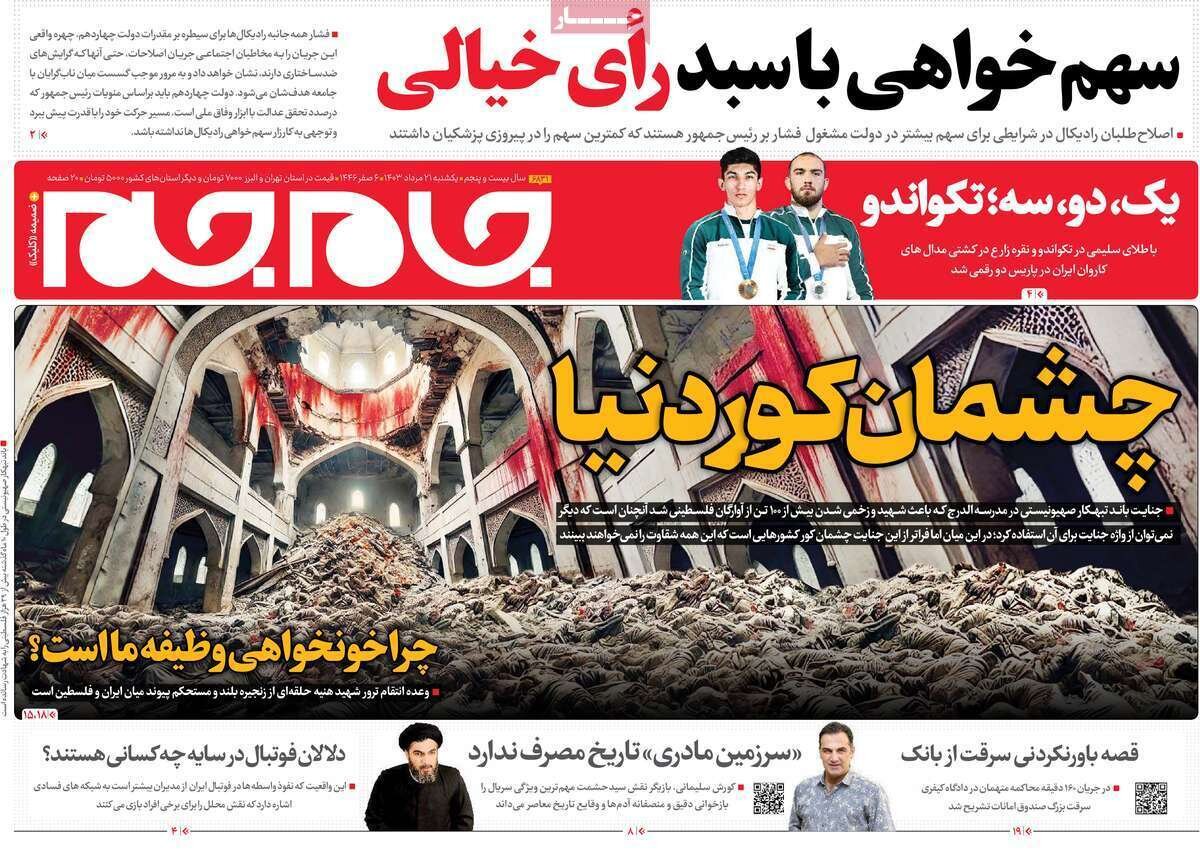The fear and nightmare of the criminal regime

TEHRAN - In an interview with Nasser Qandil, a Lebanese politician and journalist, Jam-e-Jam addressed the disturbing situation for Israelis and wrote: While the Zionist regime and the United States are trying to prevent the Islamic Republic of Iran's firm and decisive response to the assassination of Martyr Haniyeh through actors and intermediary countries, Tehran and the resistance front emphasize the certainty of this revenge.
Many analysts of regional issues and the international system believe that the resistance front's revenge will be massive and decisive, and the Zionist regime and its supporters will regret the recent crime. The current situation is a difficult situation in which the Zionists are placed, and they are paying for it every day and hour that passes. They are waiting for punishment, but they don't know exactly when and how it will be done against them. On the one hand, the occupying regime does not have the power to accurately calculate the resistance front's retaliatory operations and its dimensions and depth, and on the other hand, it cannot show itself indifferent to this definite issue for a moment. This situation is part of the resistance front's revenge against the Zionists for the assassination of Ismail Haniyeh.
Siasat-e-Rooz: The Zionist regime cannot be trusted
In its editorial, Siasat-e-Rooz focused on Israel's endless crimes and said: The usurping regime recently bombed al-Tabin school where hundreds of displaced people had taken refuge. It must be said that there is no hope of reforming the behavior of the Zionist regime and its supporters, and they should only be dealt with by force, for them, negotiation is just a tool to continue the crime. Based on this, the Islamic Republic of Iran has only one more option, and that is to hold the Zionist regime and its supporters accountable in hard revenge. The al-Tabin school tragedy showed that there is no way to cease fire. In the meantime, the countries of the region, the Islamic world, and the freedom seekers of the world, who call themselves supporters of the oppressed Palestinian people, can play a role in this revenge by supporting the harsh revenge of Iran and the resistance front. Today, the world is facing a big test. One way is to choose the right side of history to be with Iran to hold the Zionist regime to account, or to be on the wrong side of history to be a partner in the Gaza genocide.
Javan: Netanyahu is pushing Iran towards nuclear weapons!
In its editorial, Javan investigated a part of the American National Intelligence Estimate (NIE) and wrote: In this assessment, the official comments of Iranian officials about the possibility of changing the nuclear doctrine are important, and concern has been expressed that the construction of nuclear weapons among Iranians is getting out of the state of being "taboo". The key point of this report is the warning about Iran's 90% enrichment in "response to additional sanctions, (possible) attacks or blame for its nuclear program". The second option, that is, the effect of possible attacks on the acceleration of Iran's nuclear program, is not something new. For a long time, arms control researchers have been warning that military action will force public opinion and the strategic community in Iran to back supporters of credible strategic deterrence. However, it is important that the "attack on Iran" as a catalyst for the development of Iran's nuclear program has entered the public estimation of the American intelligence community for the first time. NIE 2024 is a warning to actors like Israel not to easily push Iran towards nuclear weapons.
Donya-e-Eqtesad: Riyadh, the first destination of the new Iranian president's trip?!
In a note, Donya-e-Eqtesad wrote: Analysts want Pezeshkian to make his first foreign trip to Saudi Arabia and use this opportunity to benefit from Saudi diplomacy. Diplomacy has been effective in helping to reduce tensions in the region. The reality is that Iran's priority may be to strengthen relations with neighboring countries before re-engaging with the West. For now, however, an important indicator of Tehran's intentions will be its behavior in the region, particularly its stance on the Yemen deadlock. In the case of Saudi Arabia, it is certain that they welcome the visit of the new Iranian president and will support Tehran if it finds out that Tehran is serious about improving relations this time. Such support depends on Iran showing its willingness to serve regional interests, promote conflict resolution, and try to strengthen relations with neighboring countries. However, if Tehran's regional policies do not change, such desires will face challenges. The new chapter in relations begins only with Iran's concrete steps, especially regarding the crisis in Yemen and the situation in Iraq.
Leave a Comment